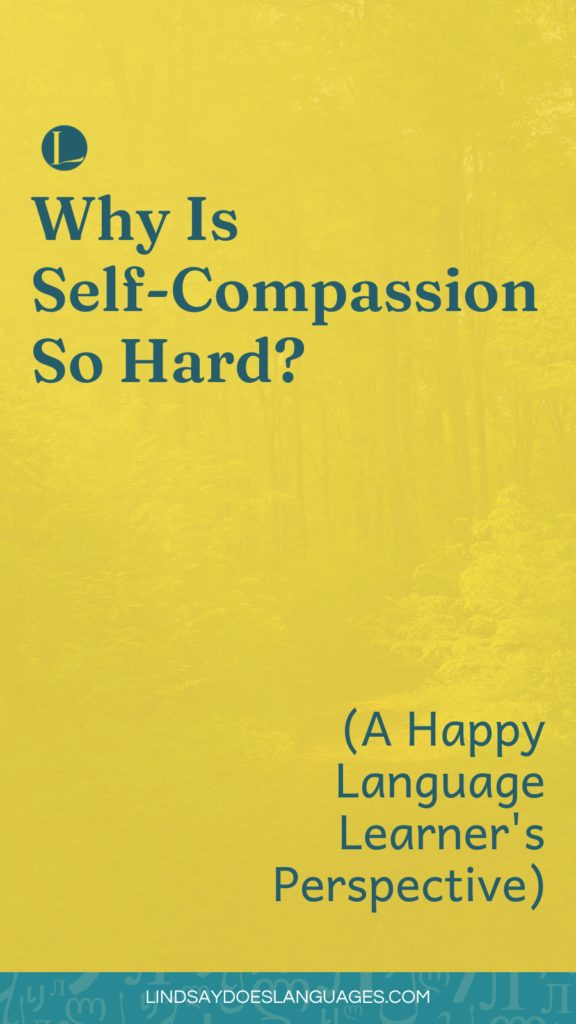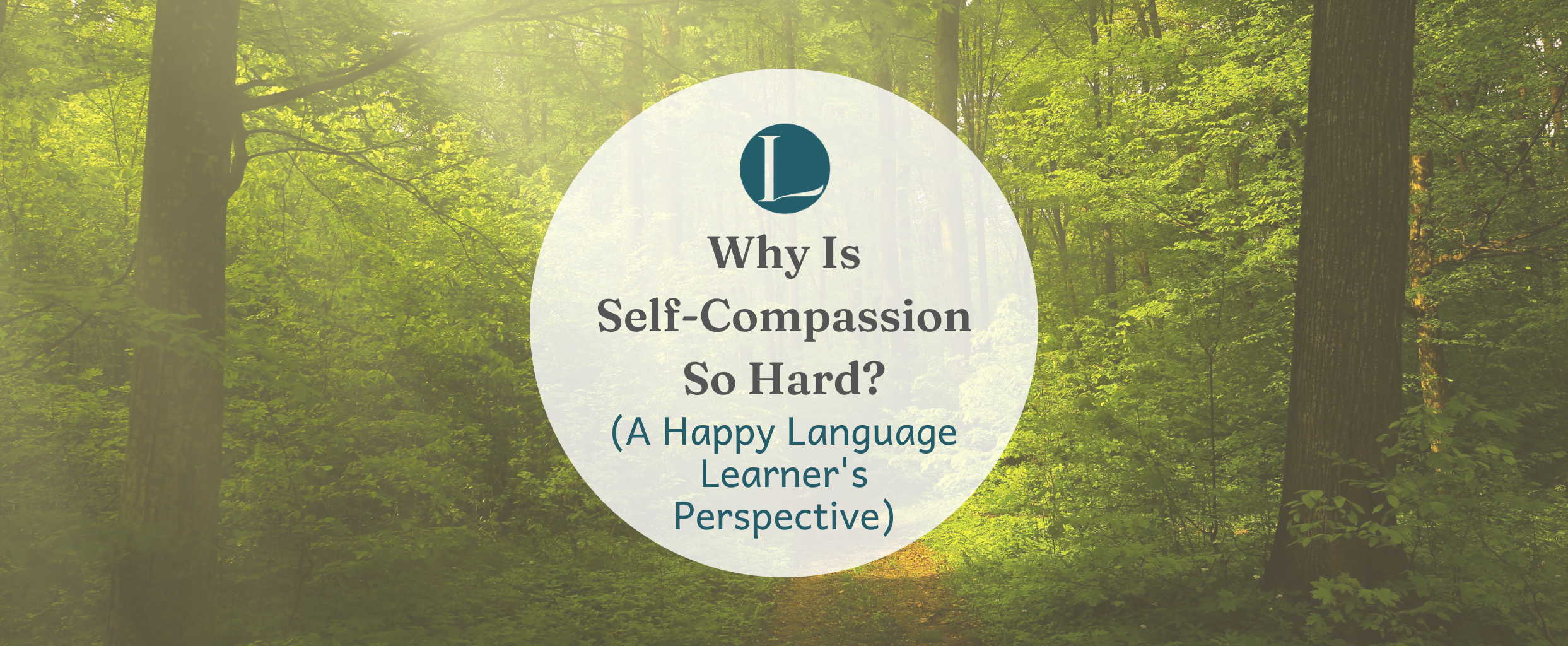Why is self-compassion so hard? Here’s 9 reasons why self-compassion is hard and why moving past them can have a happy impact on your language learning.

Why is Self-Compassion So Hard? (A Happy Language Learner’s Perspective)
Before we get started, you can enjoy this episode in the way you prefer. We’ve got a video version and the podcast below. So pick your place and let’s go!
The Video
The Podcast
9 Reasons Self-Compassion is So Hard
Self-Compassion is a Skill
Self-compassion isn’t something we’re just born with at perfect levels. It’s a skill that can take time to develop.
The fact that it’s a skill can mean sometimes we ignore it, because there’s other skills we prioritise or want to develop first. It ends up feeling like extra work.
In the case of languages, this might be developing speaking confidence or understanding a new writing system.
So self-compassion can get left behind.
But honestly? It’s like riding a bike without a helmet. Sure, you can do it, but if something goes wrong, the aftermath could be…not pretty.
Including self-compassion in your ‘skills to develop list’ when it comes to language learning makes for better progress all round.
After all, when you ride a bike with a helmet, 2 things happen…
Firstly, you’re more confident in the first place. So you do better, go further, and generally have more fun.
And secondly, if things do go wrong, then you’ve got measures in place to help protect you from those potentially crushing blows.
It’s Counterintuitive
As well as compassion being hard because it’s a skill to develop, it’s tricky too because it’s counterintuitive.
We show compassion to others, often that’s the way we’ve been brought up.
But when it comes to ourselves, we often extend this much harsher approach.
“Do the thing! Do the thing! Do the thing!”
“You failed? Get right back up and start again! No time to waste!”
So to attempt to switch from what’s become our default to a more self-compassionate approach can be difficult.
What if – instead of after you ‘fail’ at something, you allow yourself the grace & space to sit with it for a moment?
To evaluate what went wrong without critical judgement. To give yourself time to better prepare for next time.
This takes some intentional practice. However, I assure you, it’s well worth the effort.
Our Culture Doesn’t Encourage Self-Compassion
That leads nicely onto my next point. Our culture doesn’t encourage self-compassion.
I’d actually argue that it values self-criticism. Quite the opposite, which makes it hard to go against.
In modern life, either you’re pushing yourself to breaking point or you’re being lazy.
Where’s the middle ground? How did we get here?! To this place of ‘hustle & grind’ or ‘don’t bother trying’?
And then, when someone does demonstrate self-compassion, they’re labelled as selfish, soft, or delusional.
“How could they be so kind to themselves when they failed so miserably?”
“How could they be proud of that when someone else did it better?”
“Do they truly believe that was good? They must be delusional.”
This needs to end.
The truth is this: a ‘failure’ is only a failure if you don’t learn anything from it.
And besides, without failure, we don’t have a measure for success either.
We need to fail.
It is a glorious essential to being human.
It is the thing that teaches us the most about ourselves, about others, and about life.
If you haven’t already, I highly recommend the book (and podcast) How To Fail by Elizabeth Day. So so insightful, and really leading to change on this false narrative.
Self-Compassion Doesn’t Mean Becoming a Doormat
Equally, you might be hesitant to show yourself more self-compassion because you think it’ll make you a doormat. Because you think people will walk all over your new ‘soft’ self. Nope.
In fact, I’d argue the opposite is true.
When we develop more self-compassion, we develop a stronger sense of self.
This means we’re more likely to know what we want and be prepared to attend to our own needs.
Those people with that palpable sense of calm confidence when they walk into a room? They don’t get treated like a doormat. And I bet they treat themselves with self-compassion too.
Side note – I highly recommend digging into the pre-Tragic Kingdom discography of No Doubt here. They have a song on their first album called Doormat, unsurprisingly about this topic.
It Doesn’t Mean You’re Selfish
That person with the palpable calm confidence? They’re not selfish either.
The idea of being ‘selfish’ has warped in a lot of cultures around the world to encompass any time you do anything that is in your best interests.
You buy yourself a bath bomb as a treat because you’ve had an awful week at work? Selfish – you should have given that money to the busker outside.
You say no to attending your best friend’s wedding abroad because of the cost? Selfish – you shouldn’t worry about the cost! This is your best friend!
You sign up for a language retreat in Italy because you haven’t travelled in years? Selfish – you could have gone to the best friend’s wedding!
All of those things – treating yourself to a bath bomb, saying no to an event that’s not going to work for you, investing in your language learning – all could be viewed as selfish acts.
Or…they could be viewed as self-compassionate acts. After all, who knows what’s best for you? You do!
And nobody is going to look out for you as much as you can. So you should take on that role. That is not selfish.
The stronger your sense of self-compassion, the more supportive & present you can be for others because you’re taking care of yourself too.
Self-Compassion Relies on Distinguishing Feelings from Actions
Self-compassion is about recognising all thoughts and feelings as valid, and allowing them. This isn’t an attempt to quash negative thoughts and feelings.
No ‘Positive Vibes Only’ decal on my wall, thank you very much. I want the negative ones too!
(In fact – another side note – for someone who loves languages & words so much, I really do hate word-based home decor.)
Why do I want the negative vibes too? Because I want to feel it all.
Learning to distinguish between your thoughts & feelings, and your actions helps you avoid falling into The Trap.
You know The Trap. The one where you start with one negative thought or feeling and it gathers dust & grime quicker than you can say “susuwatari”.
Before you know it, you’re lost in a spiral of negative self-talk, which is kinda the opposite of self-compassion. Not what we’re going for.
And why do we end up there? Because that’s the easy option! In fact, it’s so easy we often don’t have a choice.
Self-compassion on the other hand, takes effort to develop and acknowledge and activate in situations like these.
But – the good news – it’s effort within your reach.
It Requires Vulnerability
Our world often respects the person who stayed late at the office rather than the one who respected their own boundaries and left on time.
Those valued qualities typically require closing off from your thoughts & feelings and focusing on other things more. That could be work, studies, languages…anything.
We’ve been taught that this is strength. To carry on when things are difficult, to show up no matter what.
But the truth is, the greatest strength is actually the opposite of this.
To go against the grain and be vulnerable.
To recognise our thoughts & feelings, and not judge ourselves critically for them. This requires great vulnerability, which in itself demonstrates great strength.
It can be terrifying, which is why we avoid it. But it is an essential factor in developing more self-compassion.
The big takeaway here – vulnerability is not weakness.
Self-Compassion May Challenge Your Identity
The topic of identity is so interesting to me.
The idea that we get so wrapped up with labels and identities that we restrict ourselves from certain things fascinates me.
I’ll give you an example here.
You know how at school, everyone has an identity? Think Mean Girls cafeteria map.
Well, life is basically a big high school.
We all have our identities – even if we think we’re “just not like everyone else, man”. Oh ok then, so you’re a hippy liberal eco-vegan. Got it.
See! It’s inescapable.
This means that developing more self-compassion can be hard for some of us when it challenges our identities.
This is especially true if you have a strong sense of self-criticism as being crucial to your success. It can be challenging to let go of that.
It Requires Unlearning Old Habits
Of all the reasons that make self-compassion so hard, unlearning old habits can sometimes be the trickiest.
It’s why the expression ‘you can’t teach an old dog new tricks’ exists, right?
What if that’s just an expression? What if, actually, we learn how to unlearn in the process – regardless of how long we’ve held onto our habits.
Sometimes, something that’s good for us isn’t good for us forever. But it can be difficult to let go because we’re still telling ourselves it’s good for us.
For example, there was a time when I had to wake up at 5am. Morning routines are good, you can get stuff done before the day has really begun, there’s literally a book called ‘The 5am Club’.
So I kept waking up at 5am. It felt good! I was achieving stuff! Getting my language learning in nice and early!
But over the past year, especially as I’ve wrapped up my distance learning studies for my Applied Linguistics MA, I didn’t need to get up at 5am anymore.
Does getting up at 6am now mean I’m ‘less productive’ now that I’m no longer an accidental member of the ‘better than you’ 5am Club? Absolutely not!
I feel more satisfied with life & with my language learning.
But that doesn’t mean that it took some unlearning to switch the old habit as well as a healthy dose of self-compassion.







